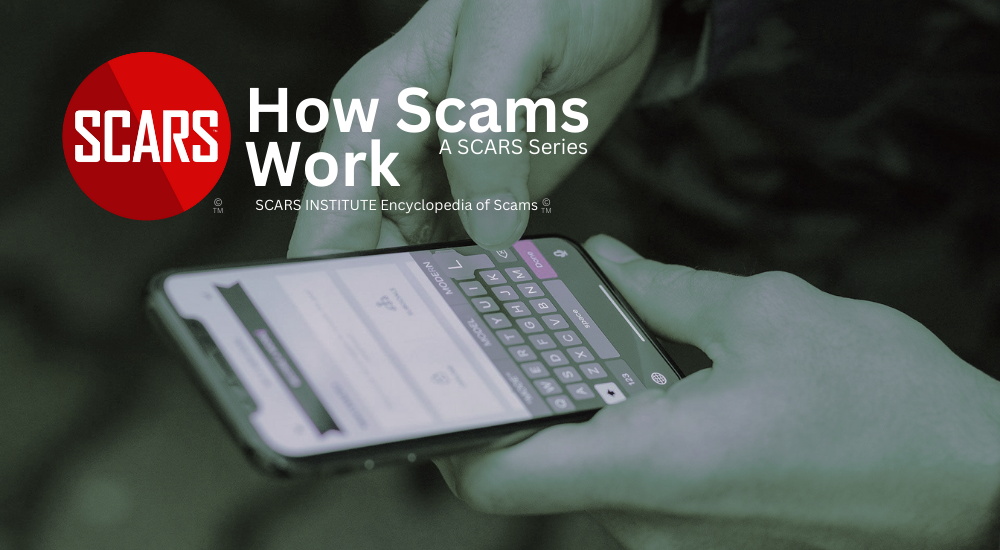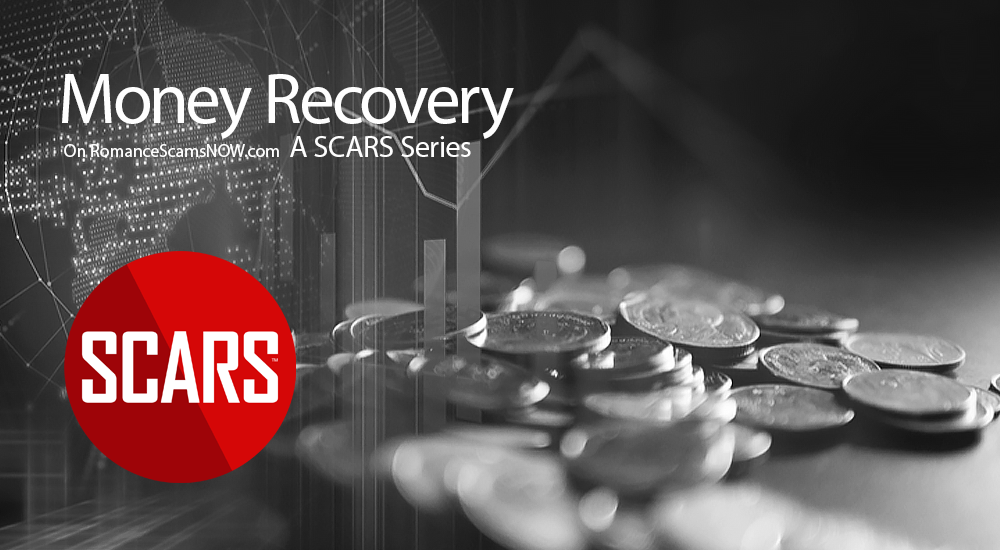
SCARS Institute’s Encyclopedia of Scams™ Published Continuously for 25 Years

You Want Your Money Back!
For Some Recent Victims That Is All They Can Focus On!
But that obsessive desperation and chasing the money can be dangerous to their recovery after the scam ends.
If you were a scam victim who lost money and you cannot let go of chasing the money, please read the following.
The Harm
What kind of harm does that do to your chances for emotional recovery and increasing your trauma?
As a scam victim who has lost money, it can be incredibly difficult to let go of the pursuit of recovering your funds. However, the reality is that chasing the money can often do more harm than good in terms of your emotional recovery and healing from the trauma of being scammed.
Once you have reported the crime to your local and national police, it is important to let them do their jobs. Your job is to turn away from the scam and the past, and focus on your present, and on your recovery!
When we are victims of scams, we often feel violated, embarrassed, and angry. These feelings can be intensified when we are unable to recover our lost money, leaving us with a sense of helplessness and a feeling that justice has not been served. This, in turn, can lead to feelings of resentment, frustration, and a desire to seek retribution.
However, the pursuit of recovering lost funds can quickly become an all-consuming obsession that can take over our lives – this is called “chasing the money” or “chasing justice.” We may find ourselves constantly thinking about the scam, checking bank statements, and looking for ways to recover our money. This can lead to a decrease in our ability to focus on other things and can have a negative impact on our mental health.
Plus, chasing the money can also increase the likelihood of encountering additional scammers who are seeking to take advantage of our vulnerability and desperation with fake offers of investigative or money recovery services. In your state of desperation, you continue to be highly vulnerable to follow-on or secondary scams like these. These encounters can further exacerbate your feelings of vulnerability, shame, and anger, causing additional harm to your emotional well-being.
In some cases, the pursuit of lost money can also lead to financial stress and strain, as you may be spending money on legal fees, private investigators, or other resources to recover the funds – many may be scams as well. This can cause you to become more financially vulnerable, which can have a profound impact on your mental and emotional health.
Obsession
Being scammed can be a traumatic experience that can leave a lasting impact on a person’s life. The loss of money, trust, and control can leave individuals feeling vulnerable, angry, and helpless. For some, this trauma can lead to obsessive behavior that is focused on recovering the lost funds. However, this kind of behavior can actually decrease the chances for emotional recovery and increase trauma.
Obsessive behavior is characterized by intense and persistent thoughts and behaviors that are directed toward a particular object or situation. In the case of a scam, the object of obsession is often the lost money. The individual may spend hours each day trying to recover their funds, constantly checking with the police and trying to apply pressure to get them to act, and looking for any other way to retrieve the money. Trying to apply pressure on the police our of desperation does not work – they have their processes and you need to let them do it, even if it looks like they are doing nothing.
This kind of behavior can quickly become all-consuming, taking over the individual’s life and affecting their mental health.
One of the ways that obsessive behavior can decrease the chances for emotional recovery is by creating additional stress and anxiety. The constant focus on the lost money can increase feelings of hopelessness, frustration, and anger, making it difficult for the individual to cope with the aftermath of the scam. The stress of trying to recover the money can also lead to physical symptoms such as headaches, fatigue, and sleep disturbance.
Isolation
The process of trying to recover lost money can also cause you to become even more isolated. By focusing so much on the money, you are not able to benefit from the support of professionals or support groups, since you are single-minded in your focus. This tends to keep you isolated from the community fo people trying to help you.
You can become more isolated from your friends and family, as you may become consumed by your pursuit and less engaged in your relationships. This can lead to feelings of loneliness and depression, which can further harm your emotional health.
Focus On What You Can Control
You cannot control the police or what they do or do not do! So just let them do what they do for a while – later when you are better equipped you can reconnect with them.
In order to maximize your chances for emotional recovery and reduce the potential harm from chasing the money, it is important to focus on the things that you can control. This should involve seeking support from professionals, joining a real victim’s support group, and if they are supportive even your friends and family, engaging in self-care practices such as exercise and meditation, and seeking professional help from a therapist or counselor.
It is also important to remember that the most important thing is to take care of your emotional and mental well-being, as this is the foundation for any meaningful recovery. By focusing on your healing and working to overcome the trauma of being scammed, you will be able to move forward in a more positive and productive direction. This may allow you to have options you overlooked early on in your desperation.
Summary
Being a victim of a scam can be a traumatic experience that can have a profound impact on your emotional and mental well-being. However, chasing the money can often do more harm than good, exacerbating your feelings of vulnerability and anger and potentially causing additional harm to your well-being. To maximize your chances for emotional recovery, it is important to focus on your healing and to seek support and professional resources.
-/ 30 /-
What do you think about this?
Please share your thoughts in a comment below!
LEAVE A COMMENT?
Thank you for your comment. You may receive an email to follow up. We never share your data with marketers.
Recent Comments
On Other Articles
- on Reporting Scams & Interacting With The Police – A Scam Victim’s Checklist [VIDEO]: “Yes, this is a scam. For your own sanity, just block them completely.” Feb 25, 15:37
- on Danielle Delaunay/Danielle Genevieve – Stolen Identity/Stolen Photos – Impersonation Victim UPDATED 2024: “She goes by the name of Sanrda John now” Feb 25, 10:26
- on Reporting Scams & Interacting With The Police – A Scam Victim’s Checklist [VIDEO]: “So far I have not been scam out of any money because I was aware not to give the money…” Feb 25, 07:46
- on Love Bombing And How Romance Scam Victims Are Forced To Feel: “I was love bombed to the point that I would do just about anything for the scammer(s). I was told…” Feb 11, 14:24
- on Dani Daniels (Kira Lee Orsag): Another Scammer’s Favorite: “You provide a valuable service! I wish more people knew about it!” Feb 10, 15:05
- on Danielle Delaunay/Danielle Genevieve – Stolen Identity/Stolen Photos – Impersonation Victim UPDATED 2024: “We highly recommend that you simply turn away form the scam and scammers, and focus on the development of a…” Feb 4, 19:47
- on The Art Of Deception: The Fundamental Principals Of Successful Deceptions – 2024: “I experienced many of the deceptive tactics that romance scammers use. I was told various stories of hardship and why…” Feb 4, 15:27
- on Danielle Delaunay/Danielle Genevieve – Stolen Identity/Stolen Photos – Impersonation Victim UPDATED 2024: “Yes, I’m in that exact situation also. “Danielle” has seriously scammed me for 3 years now. “She” (he) doesn’t know…” Feb 4, 14:58
- on An Essay on Justice and Money Recovery – 2026: “you are so right I accidentally clicked on online justice I signed an agreement for 12k upfront but cd only…” Feb 3, 08:16
- on The SCARS Institute Top 50 Celebrity Impersonation Scams – 2025: “Quora has had visits from scammers pretending to be Keanu Reeves and Paul McCartney in 2025 and 2026.” Jan 27, 17:45
ARTICLE META
Important Information for New Scam Victims
- Please visit www.ScamVictimsSupport.org – a SCARS Website for New Scam Victims & Sextortion Victims
- Enroll in FREE SCARS Scam Survivor’s School now at www.SCARSeducation.org
- Please visit www.ScamPsychology.org – to more fully understand the psychological concepts involved in scams and scam victim recovery
If you are looking for local trauma counselors please visit counseling.AgainstScams.org or join SCARS for our counseling/therapy benefit: membership.AgainstScams.org
If you need to speak with someone now, you can dial 988 or find phone numbers for crisis hotlines all around the world here: www.opencounseling.com/suicide-hotlines
A Note About Labeling!
We often use the term ‘scam victim’ in our articles, but this is a convenience to help those searching for information in search engines like Google. It is just a convenience and has no deeper meaning. If you have come through such an experience, YOU are a Survivor! It was not your fault. You are not alone! Axios!
A Question of Trust
At the SCARS Institute, we invite you to do your own research on the topics we speak about and publish, Our team investigates the subject being discussed, especially when it comes to understanding the scam victims-survivors experience. You can do Google searches but in many cases, you will have to wade through scientific papers and studies. However, remember that biases and perspectives matter and influence the outcome. Regardless, we encourage you to explore these topics as thoroughly as you can for your own awareness.
Statement About Victim Blaming
SCARS Institute articles examine different aspects of the scam victim experience, as well as those who may have been secondary victims. This work focuses on understanding victimization through the science of victimology, including common psychological and behavioral responses. The purpose is to help victims and survivors understand why these crimes occurred, reduce shame and self-blame, strengthen recovery programs and victim opportunities, and lower the risk of future victimization.
At times, these discussions may sound uncomfortable, overwhelming, or may be mistaken for blame. They are not. Scam victims are never blamed. Our goal is to explain the mechanisms of deception and the human responses that scammers exploit, and the processes that occur after the scam ends, so victims can better understand what happened to them and why it felt convincing at the time, and what the path looks like going forward.
Articles that address the psychology, neurology, physiology, and other characteristics of scams and the victim experience recognize that all people share cognitive and emotional traits that can be manipulated under the right conditions. These characteristics are not flaws. They are normal human functions that criminals deliberately exploit. Victims typically have little awareness of these mechanisms while a scam is unfolding and a very limited ability to control them. Awareness often comes only after the harm has occurred.
By explaining these processes, these articles help victims make sense of their experiences, understand common post-scam reactions, and identify ways to protect themselves moving forward. This knowledge supports recovery by replacing confusion and self-blame with clarity, context, and self-compassion.
Additional educational material on these topics is available at ScamPsychology.org – ScamsNOW.com and other SCARS Institute websites.
Psychology Disclaimer:
All articles about psychology and the human brain on this website are for information & education only
The information provided in this article is intended for educational and self-help purposes only and should not be construed as a substitute for professional therapy or counseling.
While any self-help techniques outlined herein may be beneficial for scam victims seeking to recover from their experience and move towards recovery, it is important to consult with a qualified mental health professional before initiating any course of action. Each individual’s experience and needs are unique, and what works for one person may not be suitable for another.
Additionally, any approach may not be appropriate for individuals with certain pre-existing mental health conditions or trauma histories. It is advisable to seek guidance from a licensed therapist or counselor who can provide personalized support, guidance, and treatment tailored to your specific needs.
If you are experiencing significant distress or emotional difficulties related to a scam or other traumatic event, please consult your doctor or mental health provider for appropriate care and support.
Also read our SCARS Institute Statement about Professional Care for Scam Victims – click here to go to our ScamsNOW.com website.
















This article is great advice for anyone. I was not obsessed with money recovery. In the early days and weeks after my crime ended I was focused on trying to make the credit card payments. I was successful for about a month when I wasn’t crying over the crime. I did a lot of that in the early days as well as going through the “checklist” provided by online information about reporting the scam. I have learned so much since participating with this survivor school. There is a lot of well meant advice out there but much of it falls short of providing lasting real advice that is not sugar coated. The articles here through SCARS are in depth, well thought out and composed and helps a survivor realize that they need to acknowledge what happened and they need to prioritize their recovery. I accepted right from the beginning my money was gone. And although I know I am not at fault that doesn’t help the credit card companies when they want to be repaid. It took a while to find a debt resolution company I felt told me the truth and I felt comfortable with before I signed paperwork with them. I interviewed so many before finding the one.
Dwelling on the money lost increased my stress and feelings of guilt and shame, preventing me from engaging in recovery. I also thought that if I were able to make up for the loss I would feel better. It took me almost a year to realize that taking care only of the financial consequences wasn’t enough to move forward, I had to address the trauma and other responsibilities as a scam victim. I had to allow myself to heal and recover.
A perda financeira e a busca incessante do perdido, além de prejudicar grandemente a cura, porque isola ainda mais as vítimas. Coloca-as em situações de perigo de reincidência no mundo das fraudes e dos esquemas de perda de mais dinheiro.
SCARS speaks the truth. I chased my money until I understood how it disappeared and was exposed to several recovery scammers.
The obsession of chasing the money lead me to fall on a third scammer, or money recovery scam. It took me a while to accept the money will never come back.